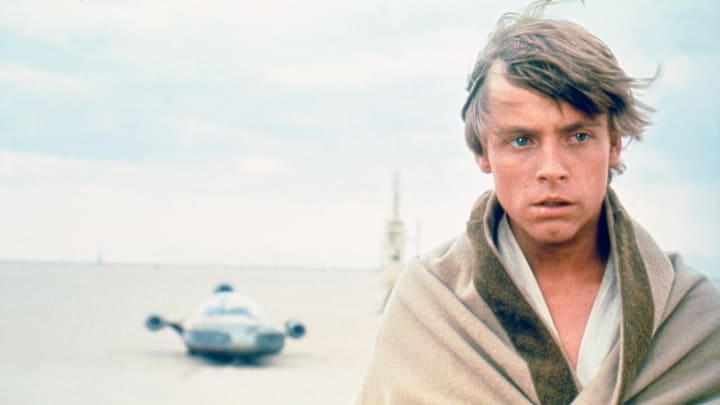Few films have undergone as many post-release revisions as Star Wars. George Lucas’s blockbuster has been altered in ways both major and minor over the past half-century, obscuring how audiences experienced it when it opened in May of 1977. If you weren’t there, you still have a chance to see it without the tweaks. The British Film Institute (BFI) plans to screen it with the full cooperation of Star Wars rights holder Disney as part of their Film on Film Festival on Thursday, June 12.
“Film on Film presents Star Wars exactly as experienced by audiences on its original release, screening from one of the precious handful of dye transfer IB Technicolor prints produced for the first British release, preserved in the BFI National Archive,” a BFI release announced.
According to The Telegraph, “dye transfer imbibition” is a print process that helps preserve vivid colors on film without significant degradation. This particular print has also been stored at -23°F, meaning it should retain much of the image quality seen during the first screenings of the film.
The print was struck in 1977 before Lucas began tinkering with it. For a 1980 re-release, he added a subtitle, Episode IV: A New Hope, that was absent from the initial rollout. According to Empire magazine, Lucas also added some new sound effects and made slight changes to dialogue.
In the 1990s, Lucas spent a considerable amount of money digitally modifying the film and its sequels to feature new and altered scenes, including a widely derided choice to have space criminal Greedo shoot at Han Solo first during a confrontation in the cantina. The additions felt like a dry run for the CGI Lucas was about to lean on for his prequel trilogy. The consequence was that some scenes—like Solo’s awkwardly-staged encounter with a newly inserted Jabba the Hutt—have failed to age well.
With the release of the Special Editions, Lucas largely abandoned the original versions of the films, relegating them to thrift store VHS or laserdisc bins. According to Vox, one 2006 DVD release had the original version but in a low-quality transfer.
Fan grievances didn’t appear to bother Lucas, who spoke often of his dissatisfaction with the original film. “To me, the special edition ones are the films I wanted to make,” Lucas told the Associated Press in 2004. “Anybody that makes films knows the film is never finished. It’s abandoned or it’s ripped out of your hands, and it’s thrown into the marketplace, never finished.” The original, he added, “doesn’t really exist anymore.”
Some fans have attempted to recreate the original cut by curating material from various sources. A “despecialized edition” made the internet rounds and can still be located, though it’s obviously unauthorized.
If you’re not in the UK or can’t otherwise attend the festival, the 1977 version is not the only Star Wars film hitting theaters this spring. A 20th anniversary re-release of Star Wars Episode III: Revenge of the Sith is due Friday, April 25.
